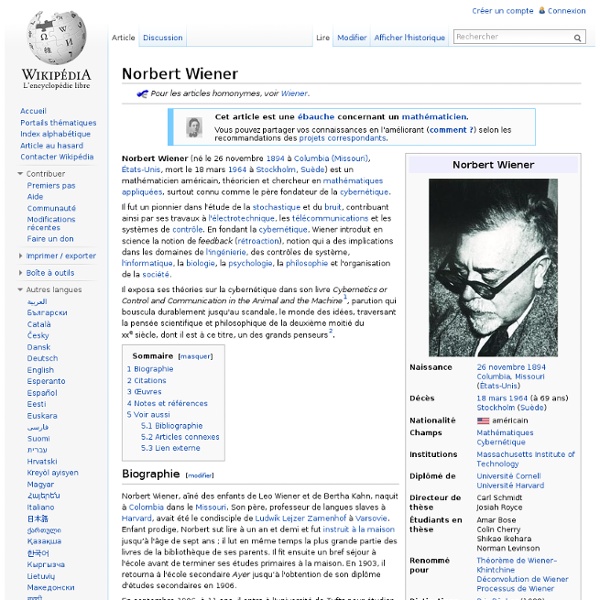



Alan Turing Alan Turing en 1936. Alan Mathison Turing, né le 23 juin 1912 à Londres et mort le 7 juin 1954 à Wilmslow, est un mathématicien et cryptologue britannique, auteur de travaux qui fondent scientifiquement l'informatique. Il est aussi un des pionniers de l'Intelligence artificielle. Pour résoudre le problème fondamental de la décidabilité en arithmétique, il présente en 1936 une expérience de pensée que l'on nommera ensuite machine de Turing et des concepts de programme et de programmation, qui prendront tout leur sens avec la diffusion des ordinateurs, dans la seconde moitié du XXe siècle. Son modèle a contribué à établir la thèse de Church, qui définit le concept mathématique intuitif de fonction calculable. Poursuivi en justice en 1952 pour homosexualité, il choisit, pour éviter la prison, la castration chimique par prise d'œstrogènes. Ses parents l'inscrivent à l'école St. En mars 1943, Turing revient à Bletchley Park. En mai 1952, Turing écrit un programme de jeu d'échecs.
Cyberdelic The Cave Automatic Virtual Environment is an immersive virtual reality environment that provides a "cyberdelic experience" where the user can contemplate perception, reality and illusion. Cyberdelic (a portmanteau word combining "cybernetics" and "psychedelic") is a term used to either describe: Advocates[edit] Timothy Leary, an advocate of psychedelic drug use who became a cult figure of the hippies in the 1960s, reemerged in the 1980s as a spokesperson of the cyberdelic counterculture, whose adherents called themselves "cyberpunks", and became one of the most philosophical promoters of personal computers (PC), the Internet, and immersive virtual reality. Leary proclaimed that the "PC is the LSD of the 1990s" and admonished bohemians to "turn on, boot up, jack in".[1][2] In contrast to the hippies of the 1960s who were decidedly antiscience and antitechnology, the cyberpunks of the 1980s and 1990s ecstatically embraced technology and the hacker ethic. R. Collapse[edit] Disillusioned, R.
Stewart Brand Stewart Brand (born December 14, 1938) is an American writer, best known as editor of the Whole Earth Catalog. He founded a number of organizations, including The WELL, the Global Business Network, and the Long Now Foundation. He is the author of several books, most recently Whole Earth Discipline: An Ecopragmatist Manifesto. Life[edit] Brand attended Phillips Exeter Academy, before studying biology at Stanford University, from which he graduated in 1960. American Indians[edit] Through scholarship and by visiting numerous Indian reservations, he familiarized himself with the Native Americans of the West. Merry Pranksters[edit] By the mid-1960s, he was associated with author Ken Kesey and the "Merry Pranksters", and in San Francisco, with his partner Zach Stewart, Brand produced the Trips Festival, an early effort involving rock music and light shows. NASA images of Earth[edit] Earth from space, by ATS-3 satellite, 1967 Douglas Engelbart[edit] Whole Earth Catalog[edit] The WELL[edit]
John Perry Barlow Un article de Wikipédia, l'encyclopédie libre. John Perry Barlow Il est l'un des cofondateurs de l'Electronic Frontier Foundation et est connu pour sa Déclaration d'indépendance du cyberespace, publiée en 1996. En août 2013, John Barlow est admis au temple de la renommée d'Internet, dans la catégorie des innovateurs. Bibliographie[modifier | modifier le code] Richard Barbrook, La liberté de l'hypermédia - Une réponse à John Perry Barlow, in Libres enfants du savoir numérique, éditions de l'Éclat, 2000, pp.55-76, texte intégral.Ahmed Dahmani, José Do-Nascimento, Jean-Michel Ledjou, Jean-Jacques Gabas, La démocratie à l'épreuve de la société numérique, Karthala, 2007, page 67.NSA : "despotique mais incompétente" ? Article connexe[modifier | modifier le code] Anarchisme aux États-Unis Liens externes[modifier | modifier le code] Notes et références[modifier | modifier le code]
Qu'est-ce que le cyberpunk? Littérature et contre-culture Qu'est-ce que le cyberpunk?